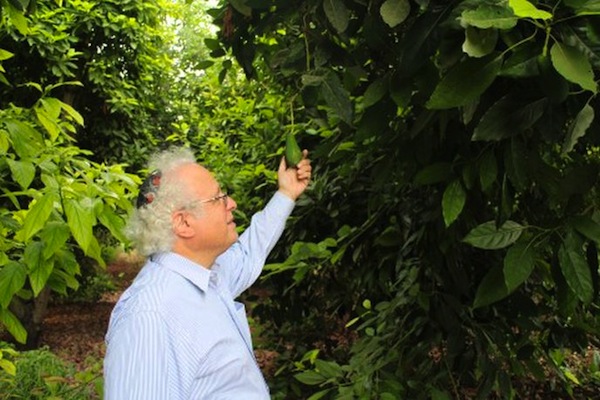Wedivite founder and groom-to-be Ben Novak. (photo from israel21c.org)
Within a couple months of its alpha launch in June last year, more than 7,000 couples around the world had already used Wedivite, the first free socially integrated digital platform exclusively for weddings. As of last week, nearly 36,000 couples had used it.
Conceived and built by Israeli groom-to-be Ben Novak, Wedivite enables sending invitations via email, Facebook, Twitter, Google+, SMS or WhatsApp, or adding a QR code to a printed invitation. There’s an option to create a custom page for a wedding registry, too.
Guests can click to RSVP, add the event to their Google calendar, get directions to the wedding, send greetings and gifts, recommend songs for the playlist and add photos to the online album and live wedding slideshow.
Additional features have since been added, such as a dedicated gift registry, integration with Google contacts and Dropbox (for photo storage and printing), text reminders for guests and designer invitation templates.
“We’re connecting everything to make it more comfortable for couples to engage guests and to make it cheaper and fun,” said the 29-year-old founder, who is bootstrapping the venture by working as a digital marketing consultant.
From Israel with love
Wedivite’s website and mobile app were launched in beta in January 2013 and became an instant hit with couples in India, the United States, South Africa, the United Kingdom and Canada. A Spanish-language version was added before the alpha launch, due to demand from users in Spain, Latin America and the United States.
Novak also introduced a Korean beta version of Wedivite, he said.
“Three months ago [prior to August 2014], a wedding organizer from South Korea emailed me and said online mobile invitations are big in Korea but they don’t have everything I am offering, and she wanted to translate all the material for me [in return for putting] her link on my website in Korea,” he explained.
While his fiancée was scouting out a gown and a hall for the couple’s May 2015 nuptials, Novak was knee-deep in the technical side of pending matrimony, learning that vast cultural differences require him to tweak Wedivite for specific audiences.
In South Korea, for instance, nobody uses PayPal or Google Maps, which are integral to Wedivite. And because Koreans don’t dance at weddings, there’s no need for a song-suggestion feature.
“One of my dreams is to create a big infographic or PDF with cultural differences between weddings that I have learned about,” said Novak, a Tel Aviv resident.
But some things are universal, such as the increasingly digital components surrounding the romance of engagements and weddings.
Mashable’s social and tech wedding survey in 2012 revealed that “relationship status” is the digital age’s version of flaunting a new diamond ring, as 31 percent of engaged women update their status within hours of accepting a marriage proposal.
Other trends show that couples are forgoing classic wedding formats in favor of ceremonies and receptions that reflect their personal tastes and create a positive experience for guests while keeping costs down.
“Wedivite is here to re-set the standard of wedding invitations from the traditional to the digital,” said Novak. “By putting social-media integration at the forefront of our platform, we recognize the influence that social media and digital presence has in the lives of today’s couples.”
Novak was inspired to start Wedivite by a conversation with a newly married friend whose wedding photographer had failed to take a picture of the groom’s mother. Though many guests take their own photos at weddings, these couldn’t easily be added to an official album.
“My idea was to make a shareable photo album for weddings, but I decided, why not make it a lot cooler?” Novak said. “Eventually, it became what it is today.”
Novak possessed the requisite skills to realize his idea, because he has been a graphic designer and web developer since age 14, and has experience working for an ad agency and as marketing director for New Media College in Tel Aviv.
“I always had my own businesses on the side, but now I am 100 percent working on Wedivite around the clock,” he said. That, and planning his own wedding.
For details, visit wedivite.com.
Israel21C is a nonprofit educational foundation with a mission to focus media and public attention on the 21st-century Israel that exists beyond the conflict. For more, or to donate, visit israel21c.org.
***
In addition to the wedding invitation and all its aspects, wedivite.com also offers a lot of other information for planning your big day. Among its blog categories are love quotes, if you’re looking for inspiration, or a few pithy phrases to round out your vows; do-it-yourself ideas on a host of topics, such as reception themes, food offerings, flower decorations, etc.; and wedding tips on photography, budgeting and more. It is from this latter section that the following advice on budgeting comes.
One of the first things that you will notice when you begin perusing wedding magazines and guides is the amount of cash that most people sacrifice to their big day. If the average $27,000 price tag has you rethinking your nuptials, rest assured that there is a better – and less expensive – way.
Beginning married life with a burden of debt may not be in the best interest of your relationship, so find some ways to have a fabulous time within a beautiful venue without breaking the bank.
Choose an off-season date
Not only will this offer you greater availability of the locations and services that you would like to reserve, you are likely to get a better price than you would if you were married in the peak month of June. You will also enjoy savings when you plan your honeymoon.
Select a gorgeous venue
This may seem counterintuitive since a lovely location may come with a hefty price tag. However, if you choose a venue that is beautiful as-is, you can skip the decorations and make the most of what your venue offers. Historic sites and outdoor locations are wonderful choices for venues that do not require additional décor.
Bargain shop
Chances are that your marriage will be just as amazing if you are married in a dress from last year’s collection for a fraction of the price of the latest styles. This single purchase offers you the opportunity to save hundreds of dollars. Shop clearance racks, online sales and reusable party supply sites for great deals on the stuff you need.
Get creative with catering
What are your priorities when it comes to food at your reception? If a sit down, multicourse meal is a necessity, be sure to budget for it. This is a potential area to save serious money by planning a buffet. Consider your favorite restaurants as caterers rather than only those who specialize in weddings.
Forget the favors
Party favors are one of those things that everyone buys and nobody wants. Your guests will not feel less loved or important if they do not go home with a piece of tchotchke that will collect dust for a few weeks before they finally through it in the trash.
Use a Wedivite invitation
Save hundreds of dollars in printing costs and postage by using Wedivite’s digital wedding invitations to communicate with guests rather than old-fashioned snail mail. It’s free and comes with a lot of cool features like a social wedding album, songs suggestion, directions for guests, wedding registries and more.
– From wedivite.com







